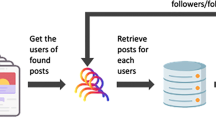Abstract
In the digital age, there is a growing demand for accurate online mental health support, yet current platforms struggle with text-based interaction analysis. This research introduces MeTAN, an innovative approach for automatic depression detection in text, offering a private and convenient method for individuals to assess their mental health early on, before professional engagement. Unlike traditional black-box deep learning methods focused solely on classification, MeTAN prioritizes explainability in health research, which is critical for high-stakes decisions in mental health. It leverages a novel encoder that integrates hierarchical attention mechanisms, metaphorical interpretation, and temporal features to detect depression and identify key textual indicators in tweets. MeTAN aims to assist psychologists by detecting and interpreting emotional patterns in social media text, thereby enhancing diagnosis in virtual settings where anonymity is paramount. Experimental results demonstrate that MeTAN outperforms existing approaches with fewer parameters, showcasing its efficacy in depression detection.
Access this chapter
Tax calculation will be finalised at checkout
Purchases are for personal use only
Similar content being viewed by others
References
Chen, X., Sykora, M.D., Jackson, T.W., Elayan, S.: What about mood swings: identifying depression on twitter with temporal measures of emotions. In: Companion Proceedings of the Web Conference 2018, pp. 1653–1660 (2018)
Coll-Florit, M., Climent, S., Sanfilippo, M., Hernández-Encuentra, E.: Metaphors of depression. studying first person accounts of life with depression published in blogs. Metaphor Symbol 36(1), 1–19 (2021)
Devlin, J., Chang, M.W., Lee, K., Toutanova, K.: Bert: pre-training of deep bidirectional transformers for language understanding. arXiv preprint arXiv:1810.04805 (2018)
Gui, T., et al.: Cooperative multimodal approach to depression detection in twitter. In: AAAI Conference on Artificial Intelligence (2019)
Han, S., Mao, R., Cambria, E.: Hierarchical attention network for explainable depression detection on twitter aided by metaphor concept mappings. arXiv preprint arXiv:2209.07494 (2022)
Hicks, S.A., et al.: On evaluation metrics for medical applications of artificial intelligence. Sci. Rep. 12(1), 5979 (2022)
Hutto, C., Gilbert, E.: Vader: a parsimonious rule-based model for sentiment analysis of social media text. In: Proceedings of the International AAAI Conference on Web and Social Media, vol. 8, pp. 216–225 (2014)
Lin, C., et al.: Sensemood: depression detection on social media. In: Proceedings of the 2020 International Conference on Multimedia Retrieval, pp. 407–411 (2020)
Liu, Y., et al.: Roberta: a robustly optimized bert pretraining approach. arXiv preprint arXiv:1907.11692 (2019)
Mao, R., Li, X., Ge, M., Cambria, E.: Metapro: a computational metaphor processing model for text pre-processing. Inf. Fusion 86, 30–43 (2022)
Mao, R., Lin, C., Guerin, F.: Word embedding and wordnet based metaphor identification and interpretation. In: Proceedings of the 56th Annual Meeting of the Association for Computational Linguistics. Association for Computational Linguistics (ACL) (2018)
Marta Coll-Florit, Salvador Climent, M.S., Hernández-Encuentra, E.: Metaphors of depression. studying first person accounts of life with depression published in blogs. Metaphor Symbol 36(1), 1–19 (2021). https://doi.org/10.1080/10926488.2020.1845096
Murarka, A., Radhakrishnan, B., Ravichandran, S.: Classification of mental illnesses on social media using roberta. In: Proceedings of the 12th International Workshop on Health Text Mining and Information Analysis, pp. 59–68 (2021)
Rao, G., Zhang, Y., Zhang, L., Cong, Q., Feng, Z.: MGL-CNN: a hierarchical posts representations model for identifying depressed individuals in online forums. IEEE Access 8, 32395–32403 (2020)
Rui Mao, C.L., Frank, G.: Interpreting verbal metaphors by paraphrasing. arXiv preprint arXiv:2104.03391 (2021)
Shen, G., et al.: Depression detection via harvesting social media: a multimodal dictionary learning solution. In: IJCAI, pp. 3838–3844 (2017)
Shi, J., Khoo, Z.: Words for the hearts: a corpus study of metaphors in online depression communities. Front. Psychol. 14, 1227123 (2023)
Vaswani, A., et al.: Attention is all you need. Adv. Neural Inf. Process. Syst. 30 (2017)
Zhang, D., Shi, N., Peng, C., Aziz, A., Zhao, W., Xia, F.: MAM: a metaphor-based approach for mental illness detection. In: Paszynski, M., Kranzlmüller, D., Krzhizhanovskaya, V.V., Dongarra, J.J., Sloot, P.M.A. (eds.) ICCS 2021. LNCS, vol. 12744, pp. 570–583. Springer, Cham (2021). https://doi.org/10.1007/978-3-030-77967-2_47
Zogan, H., Razzak, I., Jameel, S., Xu, G.: Depressionnet: learning multi-modalities with user post summarization for depression detection on social media. In: Proceedings of the 44th International ACM SIGIR Conference on Research and Development in Information Retrieval (2021)
Acknowledgments
The authors would like to thank all authors’ contributions to this work. Besides, we would like to extend our gratitude to the authors of [5] for generously making their model open source and publicly available. This invaluable resource facilitated our experimentation and analysis, enabling us to build upon their work and contribute to the advancement of depression detection.
Author information
Authors and Affiliations
Corresponding author
Editor information
Editors and Affiliations
Rights and permissions
Copyright information
© 2025 The Author(s), under exclusive license to Springer Nature Singapore Pte Ltd.
About this paper
Cite this paper
Kurian, R.S., Chaudhary, C., Nambiar, A.U., Sunny, A. (2025). MeTAN: Metaphoric Temporal Attention Network for Depression Detection on Social Media. In: Barhamgi, M., Wang, H., Wang, X. (eds) Web Information Systems Engineering – WISE 2024. WISE 2024. Lecture Notes in Computer Science, vol 15437. Springer, Singapore. https://doi.org/10.1007/978-981-96-0567-5_8
Download citation
DOI: https://doi.org/10.1007/978-981-96-0567-5_8
Published:
Publisher Name: Springer, Singapore
Print ISBN: 978-981-96-0566-8
Online ISBN: 978-981-96-0567-5
eBook Packages: Computer ScienceComputer Science (R0)




